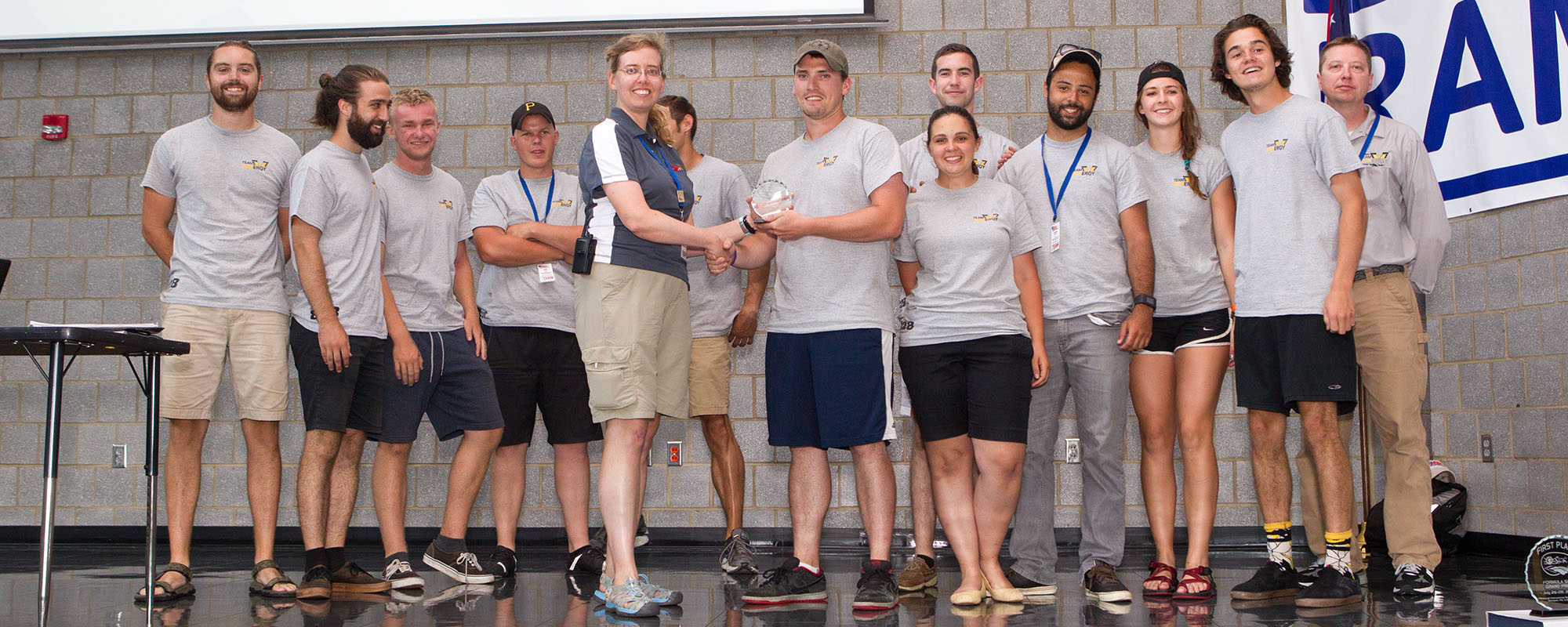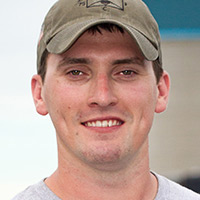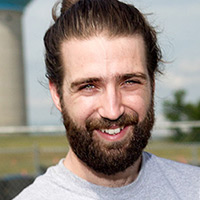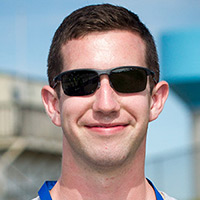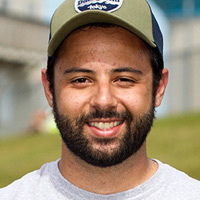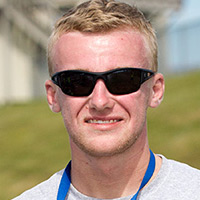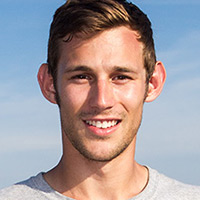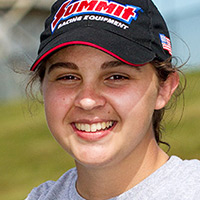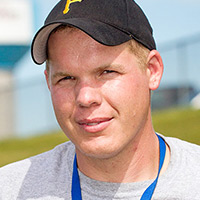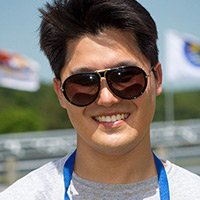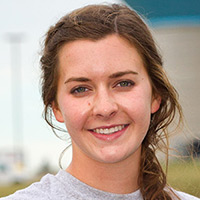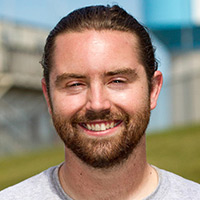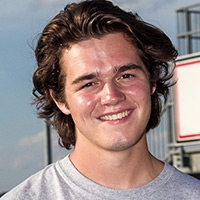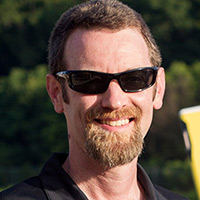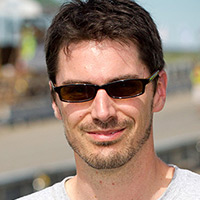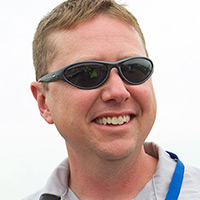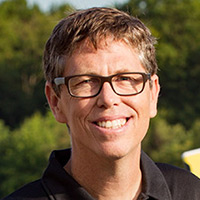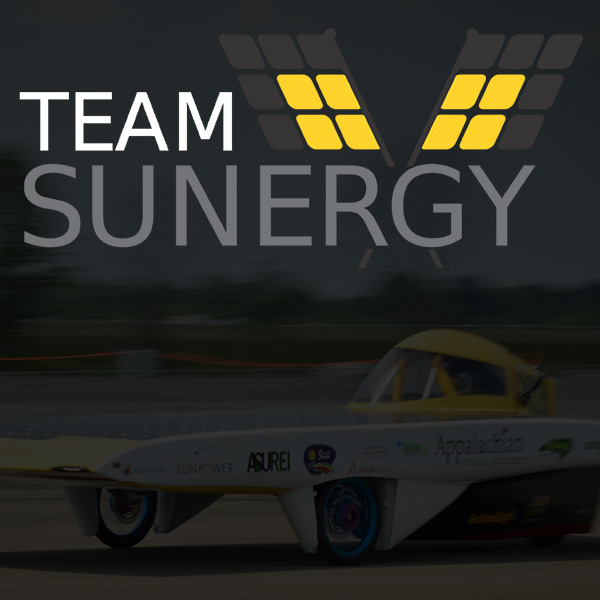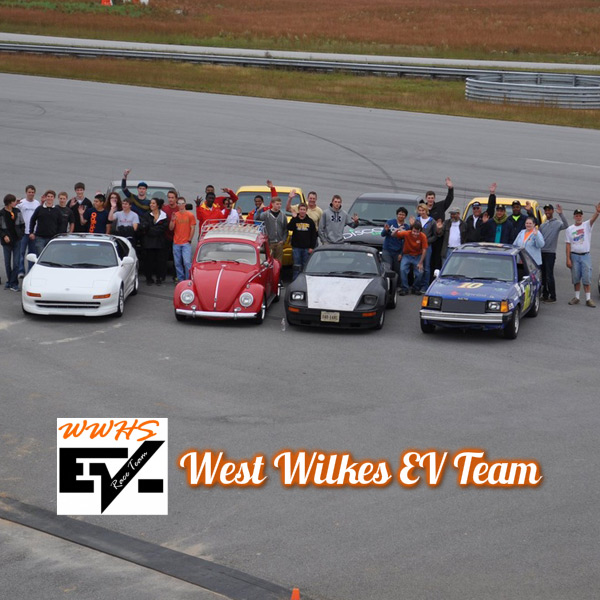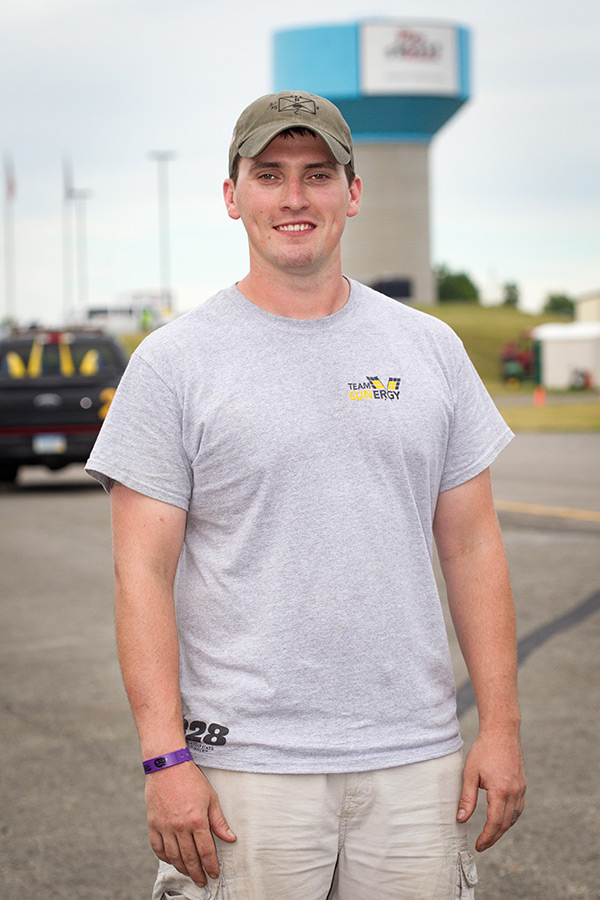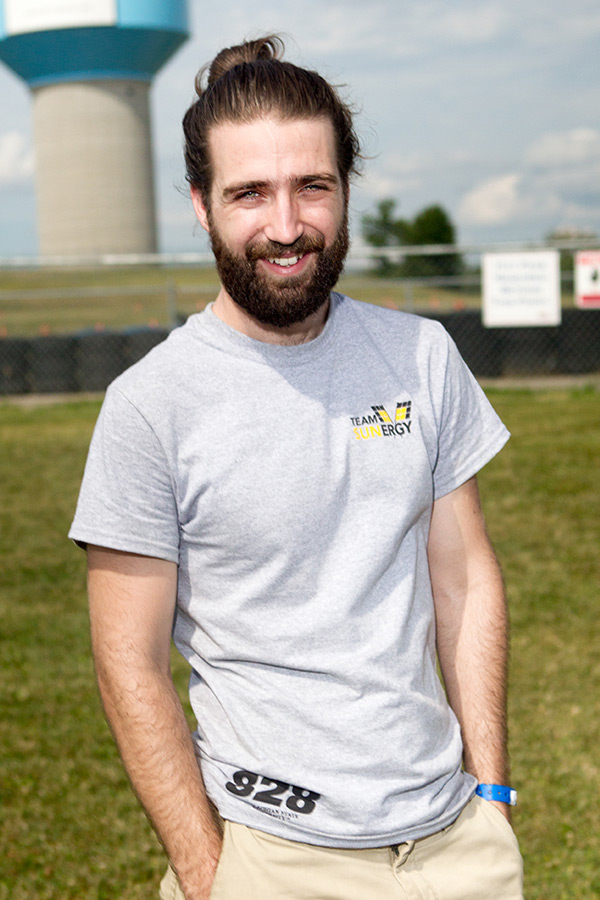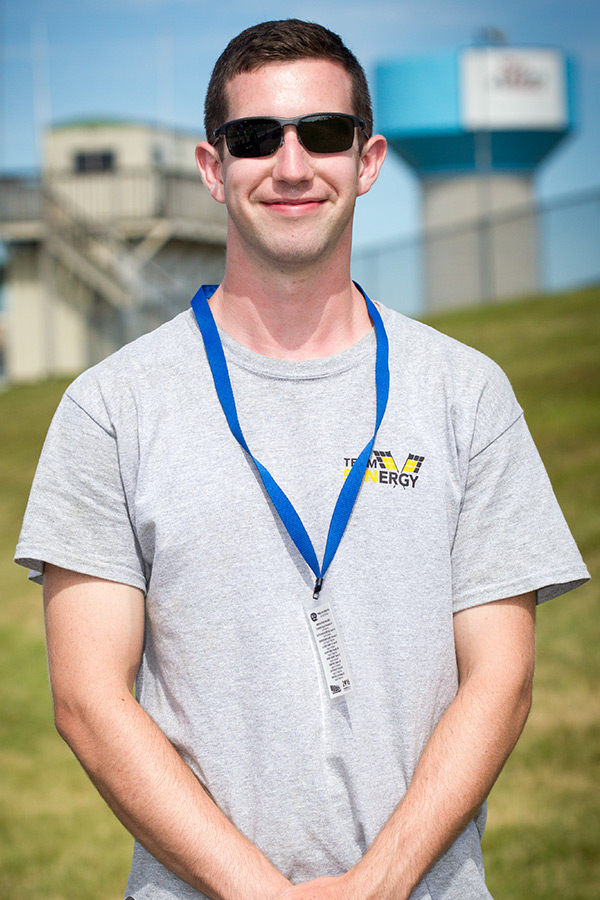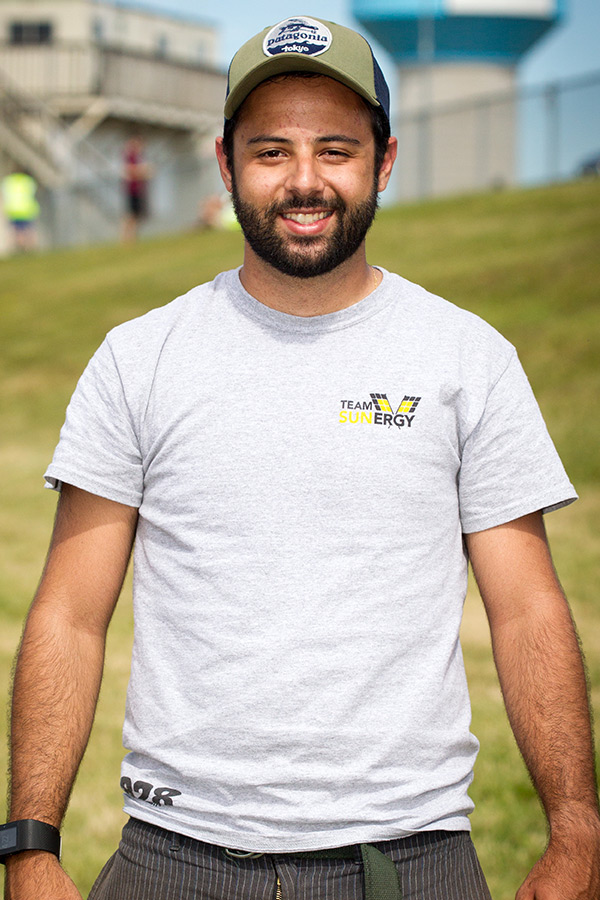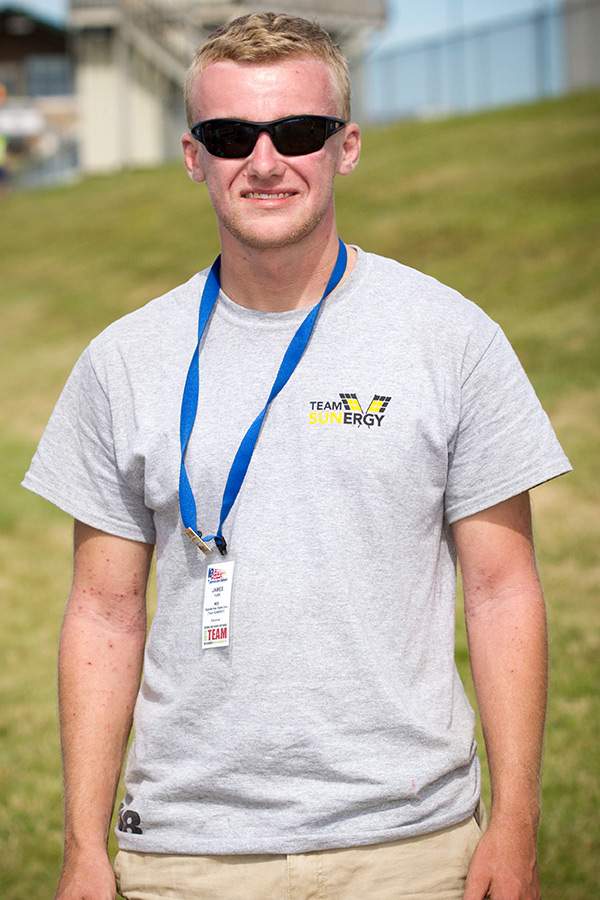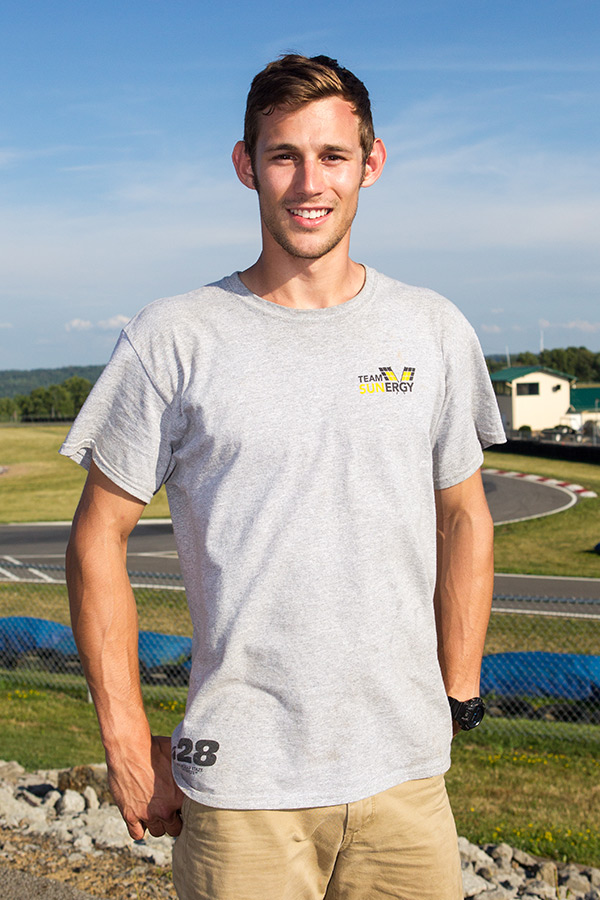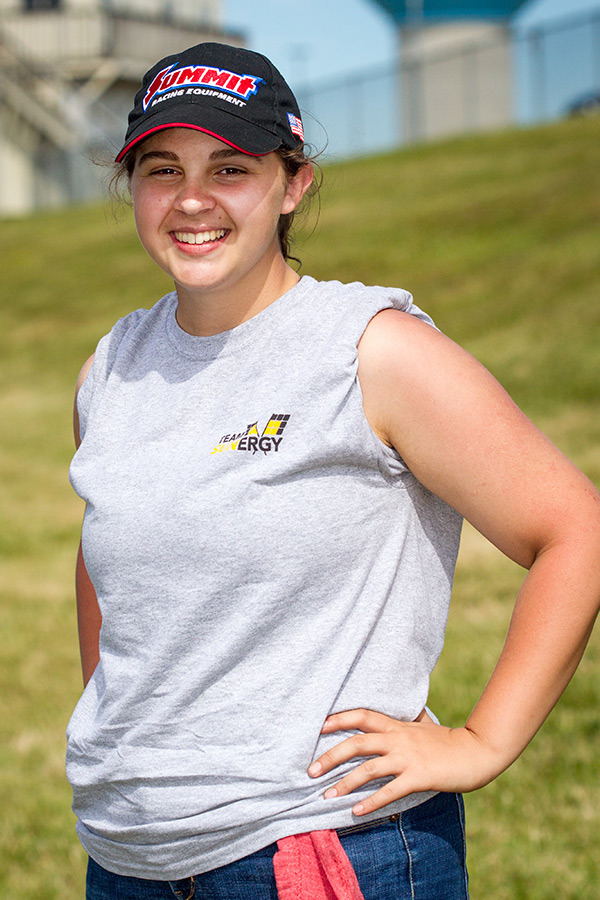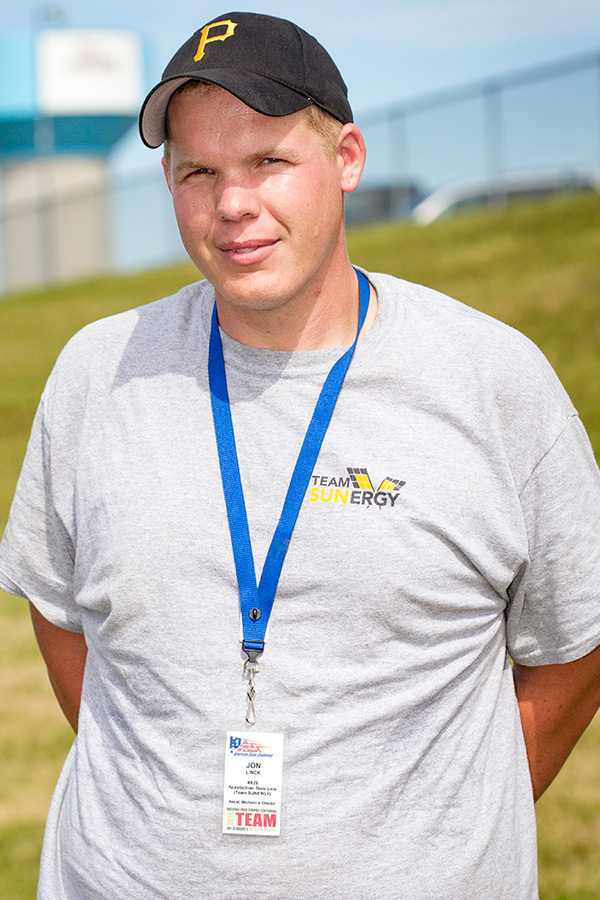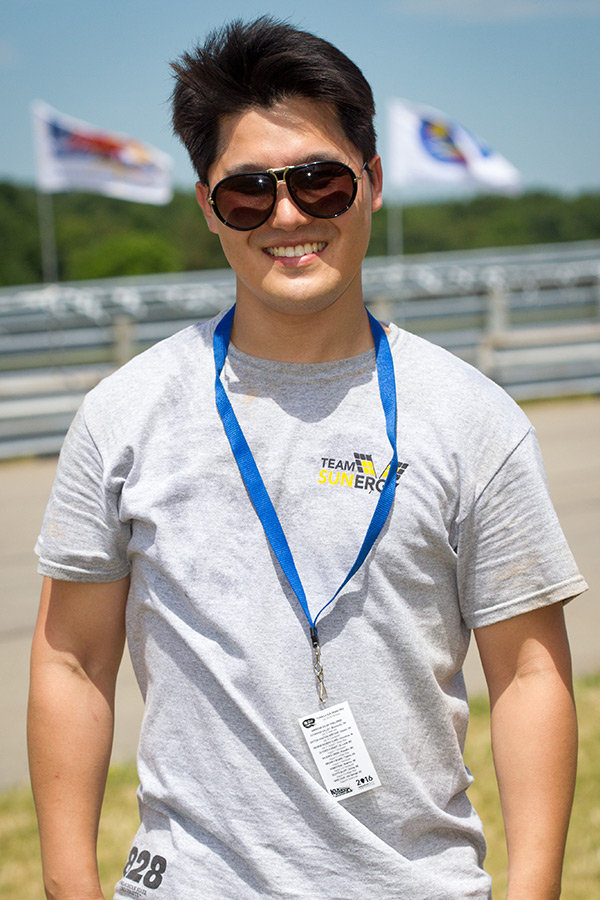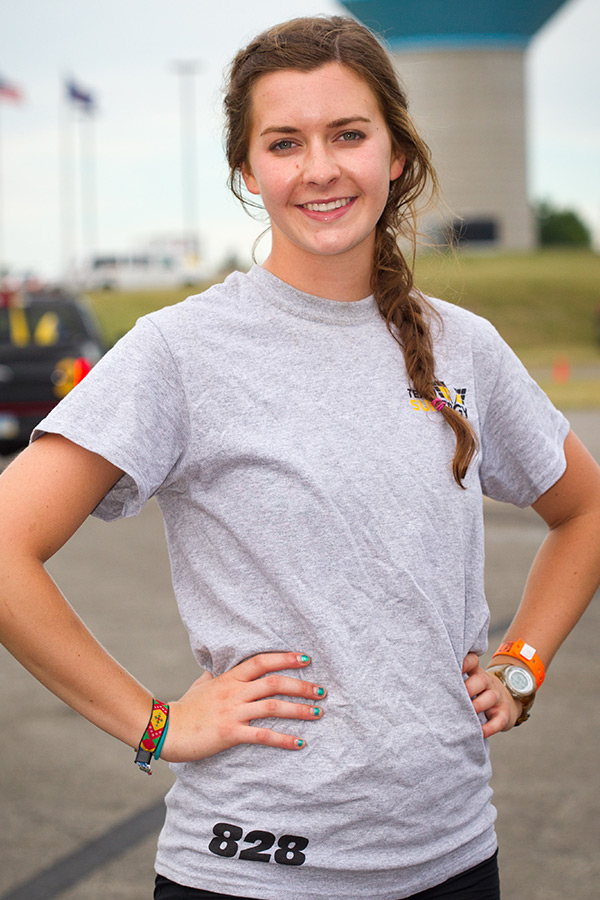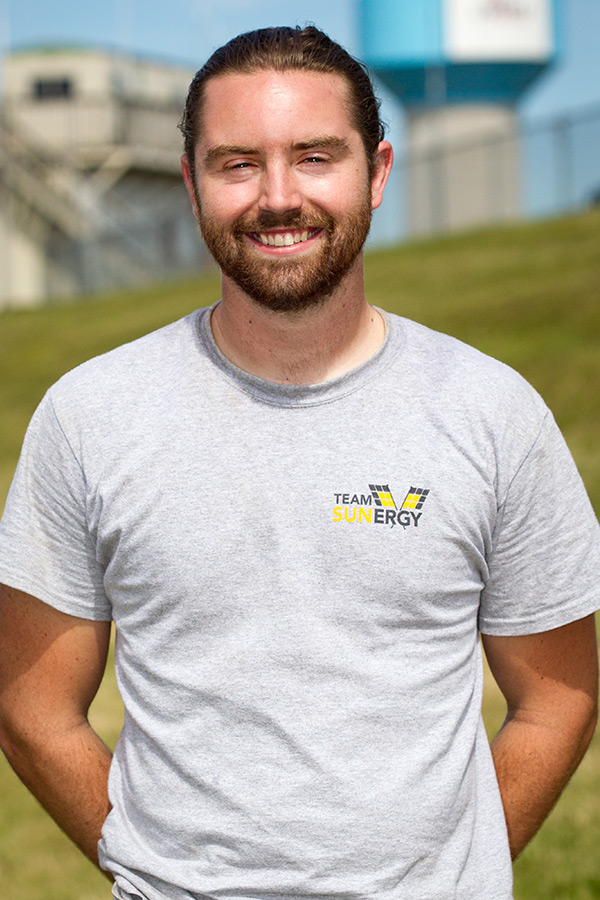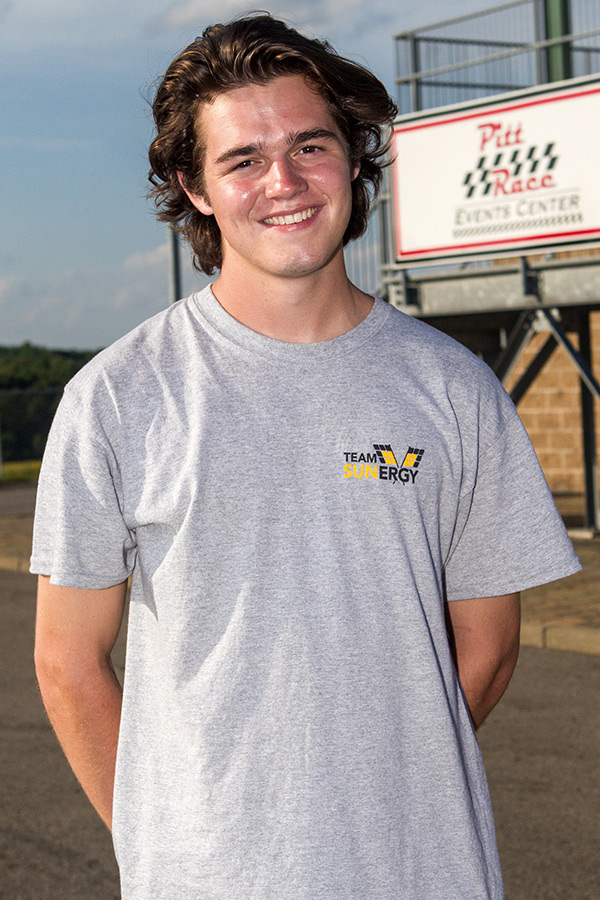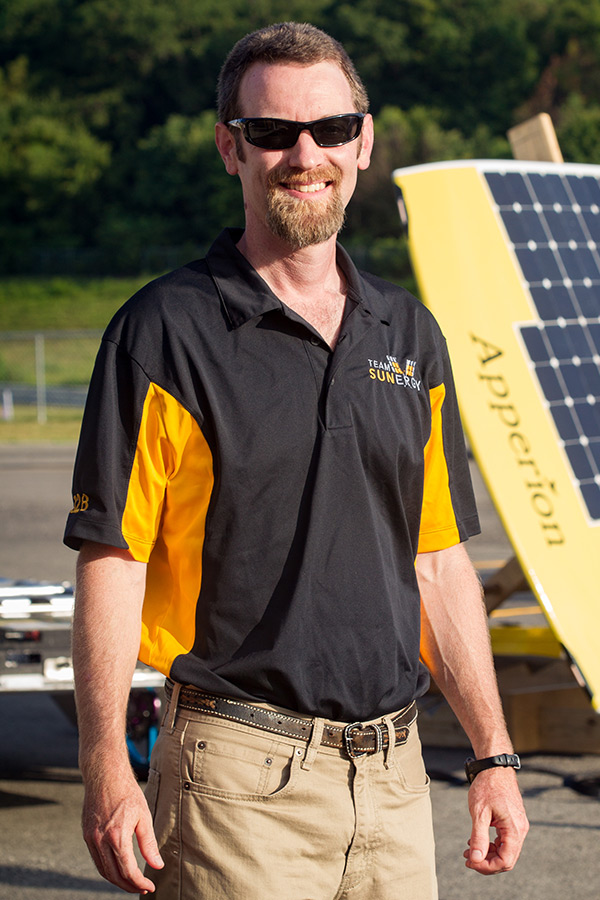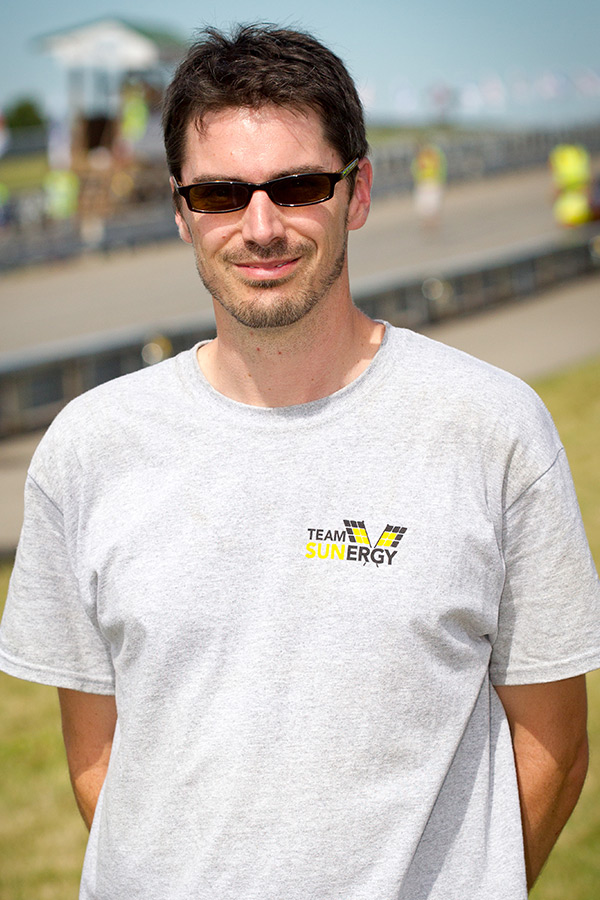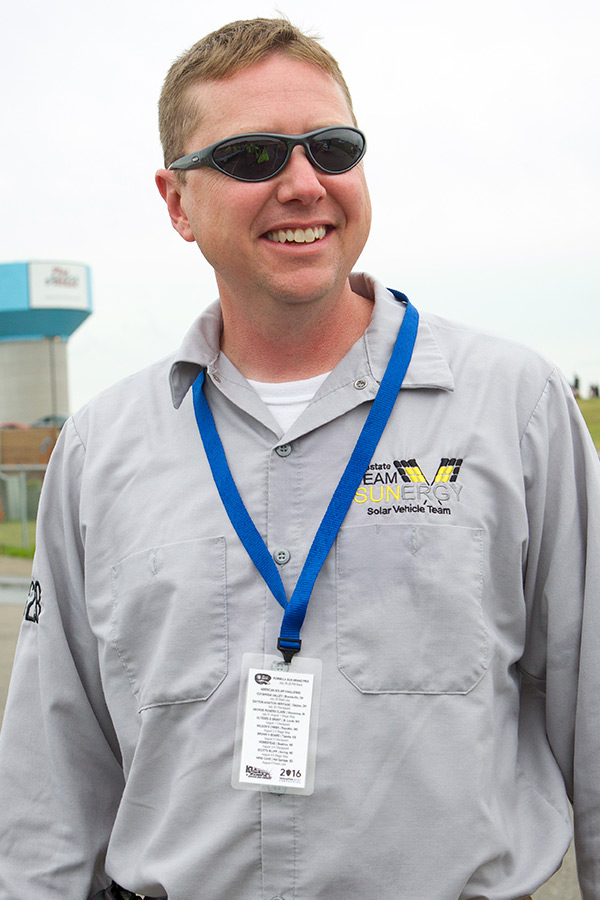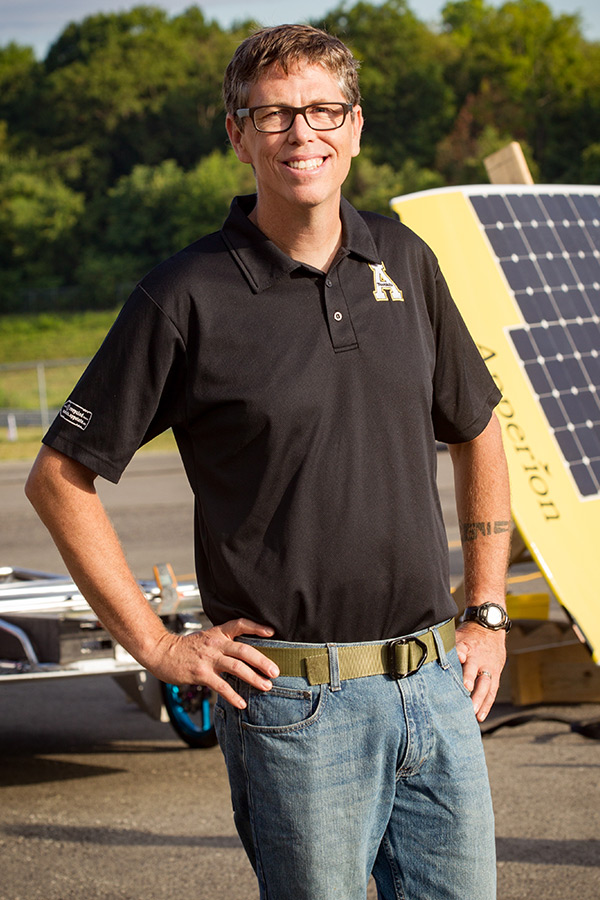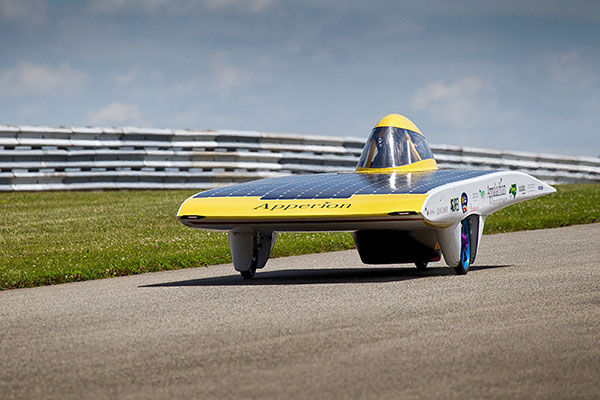-
Project Director and Founder
-
Assistant Project Director
-
Electrical Co-assistant Director
-
-
-
Interim Business Director
-
-
-
-
-
Electrical Co-assistant Director
-
-
-
-
-
Support, Outeach, Education and Development
How does a team like this get started?
Student-led and student-driven, Team Sunergy describes itself as a “joint venture between the Department of Sustainable Technology and the Built Environment in the College of Fine and Applied Arts and the Department of Physics in the College of Arts and Sciences.” The majors of the 12 team members fall predominantly into these two areas, but there are also team members from the Hayes School of Music and the Walker College of Business and the project has benefitted from every college at Appalachian.
Dr. Jeremy Ferrell, team advisor, explained the significance of the representation of the many different disciplines: “Transdisciplinary is where you go beyond just what you know, and that’s what is happening here. You see that in the diversity of majors we have [on this team]. We have a whole host of majors and they all have something they bring to the team.” Brad Johnson, who also advises the team, added that the competition gives the students critical, real-world experience with on-the-fly problem solving as a team. “It’s going to help them get jobs and [lead to] other opportunities. It’s a huge resume builder,” he said.
The team is comprised of three sub-teams: a mechanical team, an electrical team and a business team. “They are very organized,” said Ferrell, “and they have to earn their titles. By leading and taking charge and delegating and figuring out how to self-organize, they are all actively learning.”
Team Sunergy focuses on advancing the technology and application of sustainable transportation while inspiring current and future generations to strive towards a more sustainable future.
Empowering mentors
In addition to his work at Appalachian, faculty advisor Chris Tolbert teaches and coaches electric vehicle teams at the high school level. He began working at Appalachian after seeing opportunities for high school and college students to share and develop expertise together.
“I found [that] educators weren’t comfortable instructing and coaching teams like robotics and electric vehicles and solar vehicles and these kinds of technologies in competition settings,” he said. “So I decided the only way to educate [our teachers] to do this in the real world and in public education is to give them this kind of experience at the collegiate level.” He has noticed an important educational exchange. “My high school students can help demonstrate what they know about electric vehicles and the college students can share what they are learning as well,” Tolbert said. “It’s a win-win.”
View Tolbert’s work coaching electric vehicle teams at West Wilkes High School in Millers Creek, North Carolina.
Senior sustainable technology major and pit crew boss Jon Linck, who is a non-traditional undergraduate student in that he is older than the average age of his undergraduate teammates, sees a similar advantage. “The biggest thing for me working with younger students is they’ve spent their whole lives in this frame of mind that we’re learning,” he said. “So it’s hard to be confident and apply the things we’re learning in real life.” He found himself in a mentorship role, and in this role, seemed to be discovering on site what he has to offer beyond technical expertise. “It’s empowerment,” he said. “To empower younger students to know they are doing the right thing on the track, and in school and in life,” is important to him. “You want to help generate skills they can use outside the track because that is really a skill set that’s going to be invaluable for them in real life.”
Who's on Team Sunergy?
Dan Blakeley
Graduate student – accelerated admissions
Appropriate Technology and Engineering Physics
Olympia, Washington
Team role: Project Director and Founder
What we heard: Commands respect. So chill. He has it all – he’s a veteran, a Ranger, a graduate student, he has the skills and he’s a natural-born leader.
Transcript
Dan Blakeley: It’s a very long story, but long story short, somebody I served with in the army actually came to Appalachian State University. When we were serving together we kind of grew up together in the army. We went to basic training together. We went to ranger school together. We went to the ranger indoctrination program together. Airborne school. We even went to the same platoon and served in the same platoon for four years together. So, we both always talked about sustainability and different programs and things that we wanted to do after the army. He got out two years before I did and came to Appalachian State University. And after his first year, he got me to come out and visit him. I saw the mountains and I fell in love with the program and the department and just to see all the different projects and things that were going on, I just got really excited. And so that’s how I ultimately chose Appalachian State University.
When I served in the army, I learned very early on that everybody needs to be a leader, but needs to kind of find their area of leadership and their role within the bigger picture and the bigger community. When I was looking for a university, I really wanted a university that would allow me to step into a leadership role easily again. And when I came and visited Appalachian State University, I saw that. There are student projects all around campus. And you can see students working on them and being invested in them, and interested in them and wanting to develop them. And having the faculty and staff support to really take that drive to want to be a leader and have a project of your own and carry it forward is really what got me excited to be here at Appalachian State University. So, anybody coming in really has that opportunity coming to our university and really exploring all the different options that we have.
Quotes
“You have to be willing to learn from every person. And you need to be able to be in their shoes and not be afraid to learn. When you’re teaching someone, you have to ask: Have they been told what they need to know? Can I explain it in a way they can comprehend? The terminology is technical. I try to tell it once so they can understand and move forward.
“By far the best faculty I know of are our three advisors. Each brings something different to our team. Chris Tolbert is a motivator. That’s the No. 1 trait he brings to the team. Dr. Jeremy Ferrell has been awesome in learning with us, figuring out how to get through the system and learn the ropes of the university and how to get things done and for keeping us on track. And Brad Johnson, he gets along with everyone on the team and has a high level of expertise and technology, especially in engineering. They are the best combo of the three areas of need we have on the team.
“I knew I’d go to App State or Oregon State because they had the best sustainability programs. I’m so glad I chose App State. I probably wouldn’t have been able to do some of the things I’ve been allowed to pursue at Appalachian at any other university.
“I foresee in the next five to 10 years you’re going to see more solar vehicles on the roadways. Ford has actually developed a hybrid and applied solar to the rooftop with enough charge off that array to get you 20 miles of commuting miles. We won’t have solar cars that travel across the country easily, but definitely there will be models that supplement the commuter miles and demand we have day to day.
“We are all looking ahead to the future. Some of us see racing as the pinnacle of developing technology for transportation vehicles. The technology we’re perfecting can help us develop the next generation of vehicles that people will be driving in the next 20 to 30 years.
“When I served in the Army I learned early on everybody needs to be a leader, but you need to find your role in the bigger picture. When I was looking for a university, I wanted to find a university that would let me step into a leadership role and I saw that here. There are student projects all around campus. You can see students being invested, and interested, and having the faculty and staff support that takes that drive to be a leader and move it forward. Anybody at our university has that opportunity if they will explore all the possibilities.”
Return to top
Duvey Rudow
Senior, accelerated graduate program
Physics
Asheville, North Carolina
Team role: Assistant Project Director
What we heard: Outgoing, flamboyant. Switched his major from performance arts to physics. Told team if Apperion placed in the qualifying race, he’d let the team members cut his long hair any way they wanted.
Transcript
Duvey Rudow: So I’m actually originally a performance major. I did theatre, dance, creative writing, public speaking, stuff like that. And physics was my minor. I sort of, as I was getting to the end of my career I realized that it would nice to be able to get a job afterwards. So I started looking for some other activities to get involved in. I switched over to physics. So I graduated and am now pursuing my physics degree and in one of my classes Daniel Blakeley, the project director, he sort of stood up and he made an announcement and said “hey guys uhh I’m with the Solar Vehicle Team, we are looking for new people. We got an interest meeting. Why don’t you come on out and check it out.” And I went in and I didn’t know exactly what to expect, but then the more I got on the team and the more I met the people the more I realized that the people on the team are just fantastic. It feels really nice to work with people who are smart, driven, fun. I mean, I couldn’t ask for more in a team. Even though we sometimes have to stay up ‘til two in the morning working on something, it’s really fun. We got music playing, we’re all joking around, we might drink too much Red Bull sometimes, but I really couldn’t ask for more. It’s been really great for me to really work with a team and figure out how I work best with a team. I think that’s what I’ve gotten a lot out of this. Sorting figuring out my role and how I can best help the people that I’m working with. It was really great. My parents actually were able to come out and they were here seeing the car and they kept on saying how proud they were of me. It’s really nice to sort of give back to them and make them proud. It means a lot to me so...
Quotes
“This has been a long journey. When I joined, we had the car up and running but I never saw the car drive until this spring. That’s when we picked up steam. We had issues left and right with the car, with money, with people… we worked through them all. Getting here and seeing the car on the track and seeing all the other solar vehicle teams makes all of it worth it in the end. We’ve spent a 1,000 team hours on this car at the bare minimum. To finally see all the green stickers on our scrutineering sheet… it’s unlike anything I’ve ever done.
“One night during scrutineering, we were having problems with a wobble. We talked to another team, spent about an hour with them. We took the motor apart and worked together to solve the problem. It’s about how well can we all do, together. It’s not a competition, but a group solution.
“If I can do this, if we can compete and do well – 12 people sleeping together and working all day together – in the end we’ll know we can function as a team and we can do it again in the future.
“How do we make a more efficient form of transportation? For us, this is a sustainability issue, not an engineering challenge. It’s important because a large percentage of all carbon emissions come from transportation. Any way we can begin to mitigate that is huge. A solar car is free energy.”
Return to top
Jake Barnes
Senior
Physics
Chapel Hill, North Carolina
Team role: Electrical Co-assistant Director
What we heard: On track for graduation in four years. He aspires to become a Naval Special Warfare Officer in the SEAL teams. On the down low, he is the solder king.
Transcript
Jake Barnes: It’s been amazing, I mean, we have a bunch of different people from different backgrounds. Pedro’s from Brazil, I mean, he’s only been up here for a couple of years and studying only. He flew up specifically last Thursday to be here for this race after he already graduated. After he already submitted his thesis paper. I mean, it’s great to have someone so dedicated to this. And then Dan has been an amazing project leader. His experience in the military has really led us very well. I mean, we wouldn’t be here without him. You know, dealing with people who like from the business team, the mechanical team and understanding a lot more about mechanical stuff now...it’s useful information. Then the business thing, fundraising. I mean, we’ve had to fundraise ourselves pretty much for a really long time now we’re getting the support we need. It’s great, but for a long we were struggling. Going through that struggle has made us stronger as a team so. The biggest take-away is probably dealing with stressful situations with low sleep. Diagnosing things and trying to be very quick about repairs, it’s worked out so far, but the first couple of days going through scrutineering was really stressful. It was wake up six o’clock and then be done around twelve so we’d get very little sleep. Go back to the hotel and get up at six again. It’s been a great experience, I think so far. I mean, I’m happy to be here.
Quotes
“Although we got the body and frame from Iowa State, we built all the mechanical components and electronics, including our own telemetry system. Basically it was proof of concept today. Coming out on Day One, we were in third place. We’ve qualified. It’s amazing. I’m really proud of the team so far.
“It’s a cool project. Ten months ago we started team meetings once a week, then having active workdays every Sunday. First day, we started by organizing all our stuff, went on from there... putting in parts, making joints and repairs, soldering stuff. We’ve come a long way.
“Self-fundraising has made us stronger. Dealing with stress, low sleep, repairs… it’s worked out so far. Scrutineering was really stressful … working six to midnight, then dealing with car failures and stuff… still, it’s great. I’m happy to be here.
“Why is it important that we’re here? They’ve been running solar cars since the ’80s. We’re still pushing the frontier between research and the market. It’s feasible to put a solar-powered car on the road… not too far away that they are in everyday life. Through fossil fuels, we’ve destroyed our earth and we want to reduce that impact as much as possible.
“Sustainability? My dad was teaching me really young. One of my first science experiments was a hydrogen fuel cell, using electrolysis to separate hydrogen from water so that can be burned as a fuel source. It’s really important that everybody get behind leaving our kids a better place.”
Return to top
Pedro Franco ’16
Master of Science in Technology, renewable energy engineering concentration
Belo Horizonte, Minas Geras, Brazil
Team role: Electrical Director
What we heard: A major player for the team and on top of everything. After graduation Franco flew to Brazil for one day to see family, returning the next to make scrutineering.
Transcript
Pedro Franco: My name is Pedro Franco, I’m actually from Brazil. I did my undergrad in electrical engineering back there. I’ve been working with the team for like almost two years. And we went to the race last year, but just now we’re getting to experience racing. So I actually went back to Brazil for a day and came back here just for the race. Dan started the project and when I joined the team, we didn’t have a car. We only had a few ideas, but still we had no clue what to do. And with the help of Iowa State University we got the car donated. We went to Texas. Didn’t get the chance to race, but we showed them that although we’re not an engineering school, we’re not playing right now. We’re here to compete. Show that we can do as good as they can. And so far we are proving them that we can do it. So this is great. I honestly kind of like had to hide my face because I was crying a little bit just because got a little emotional because at the moment we were like almost ten laps and we qualify to the ASC. I was like wow. It’s just exciting.
Quotes
“When I came we had nothing, just paperwork. We didn’t even have a car, just a few ideas and no clue what to do. We learned from other schools [at a conference in Michigan and last year in Texas] and now we showed them we were here to compete, can do as good as they can. When we were in third place, I honestly had to hide my face because I was crying a little bit... we were only 10 laps from qualifying for the ASC.
“The way to bring attention to solar [transportation] is through racing. The principles of [solar] are easy and by racing we show everyone sustainability is possible. In Brazil what we do mostly is hydroelectrics. Although that is kind of a renewable source, you are flooding an area and that is not good for the environment. For me, sustainability is to try to use natural resources without damaging the world.”
Return to top
James Furr
Freshman
Sustainable Technology, minor in physics
Charlotte, North Carolina
Team role: Electrical Team — “jack of all trades, master of none”
What we heard: Furr is the youngest of the team. Loves cars and sustainability, so joining the team was a no-brainer. Chose Appalachian because “above all it feels genuine, it’s a homey place.”
Transcript
James Furr: So I’m a freshman, the only one on the team. I found the solar car through word-of-mouth and I love cars and I love sustainability, so I thought this would be right up my alley. So I did everything I could to find it and I did. Working with the team has been a great experience. It’s been more like an actually job than I thought it would be. And I’ve learned quite a bit more than I thought I would. I would spend long periods of time with them, you know, being up late working on things and just seeing, you know, how to solve problems in a physical sense. It’s totally different learning style than school and I really like it. It’s a great way to do it. So the graduate students basically run the program. While we do have faculty advisors and the program is run by grad students and seniors. And having upperclassmen run it, there are certain degrees of freedom you get. And that’s kind of a nice thing. ‘Cause you’re not really looked upon, you know, as a student, you’re looked at as a peer. And that’s a really good thing. So this experience is going to give me more knowledge about electrical, mechanical and even on the business end of things. We don’t have a really big team and since we, you know are self funding, everyone is involved in everything. So this is how an actual job would be if you were to be in one. Maybe not as, like you would probably have a more specified job, but being able to see everything that goes on in a team is very I don’t know, it’s a mutualistic experience.
Quotes
“Working with the solar vehicle team has been more like an actual job ...we work for long periods of time, and are up late at night. I’m learning how to solve problems in a physical sense. It’s a totally different learning style than the classroom.
“I like that we have graduate students. Because they run the program, we have a certain degree of freedom. I’m not looked on as a student but as a peer. That’s a good thing. We are a small team and self-funding… everybody is involved in everything. As a liberal arts university we’re kind the odd fish [in the competition] … but we have a very symbiotic relationship with everybody here. All the teams are great.
“I found an interest in sustainability in high school. I’ve always liked it when you can see the inputs and outputs and it’s all balanced and things work well and that’s a fantastic system. When you look at the world today, it’s not like that. It’s very much a linear of build, destroy and dispose of the waste and we don’t do anything with the waste. With this [the solar car] … we don’t create any waste. It’s a beautiful thing.”
Return to top
Andrew Grimes
Senior
Finance and Banking, Computer Science
Raleigh, North Carolina
Team role: Interim Business Director
What we heard: Super organized and a stellar teammate. Grimes is quite tall and held up the shell during pit stops. He also was the person willing to do the team’s laundry at 1 a.m.
Transcript
Andrew Grimes: I got involved with the Solar Vehicle Project this April actually. Six months ago, I didn’t even know there was a solar energy team on campus. There were 20-some students together working on this project, doing incredible things at a liberal arts college. As soon as I heard about it, I came out to a meeting and met everybody and felt like I was at home. It was really the group at Appalachian State that I had been looking for. And when I joined this team, I wasn’t sure how I could really contribute, if I could really contribute. But as time past, I realized it wasn’t so much about me contributing to them as it was a mutual trade off. I was learning about things that I haven’t really been exposed to and talking to really smart people about things that I was curious about. Its challenged me to learn how to understand the needs of these engineers, essentially. There’s a communication barrier between the business world and the technological side of all the industries doing this cutting edge innovation. And if you don’t have good communication, you don’t have people trying to understand what they need to get their work done. It’s going to slow the process down. So what I’ve really gained from this experience is to be patient and try to understand. Know my limitation in understanding the technical details in things, but at the same time trying as hard as I can to understand as much as I can to fulfill their needs in way that I can.
Quotes
“Talk about right place, right time. This is exactly that for me. As interim business director, I work to keep the team connected, organize outreach events, reach out to sponsors for parts and money. Being a business major, working with the car is a huge privilege. I love being hands on but I know these guys are the experts.
“I want to make sure [people] know who we are, what we’re doing and all about our mission for sustainability. If folks don’t know about us, then what are we doing? The sustainable technology majors didn’t come to college to design a car… they came to make a difference in the way we use energy and generate energy and how we impact our earth.
“It’s important we are patient with one another. Understand what we may and may not know. It’s a learning experience to be together at a competition of this scale. We’re living together, we’re sleeping in the same beds. The ability to work together for the greater goal and put our personal needs aside.
“Our project manager, Dan Blakeley, is a veteran who’s done incredible things in his life and inspires us all to be better because he’s the best. He’s the guy who’s there at 1 a.m., he’s the guy who opens up. He’s on top of everything, all the time. To see him in action is breathtaking. His commitment to this goal, to achieving a more sustainable future and driving us to be better has changed my perspective on what can be done.”
Return to top
Abby Hastings
Senior
Physics
King George, Virginia
Team role: Co-mechanical Director
What we heard: A self-confessed giggler. Hastings’ parents, supportive as always, joined her at the race. She credits her dad with giving her an Erector Set as a young girl and steering her toward science. She’s a major player with the pit crew.
Transcript
Abby Hastings: This year my role has kind of been more of like a checkup, making sure that everything is still running okay. Doing a little bit with the shocks just to make sure everything is okay, like before, they were too tight and we figured it out; fixed it. A lot of like, little things that you don't think about when you're building a car, that's pretty much been my role, but since I’m graduating in December and were starting a new car right after this, I’ll be a lot more heavily involved in the design process so I actually will get to work on the frame and doing all those kind of stress and jounce calculations for the shocks, which I'm really excited about. When I first heard about it, it was like “oh my gosh this would be so incredible to be a part of” but as it’s come closer, the work started building and everything, and I still don't think it’s clicked in my head how big of a thing this is. Every once in awhile I have to remember that this is the only one in the country and multiple countries are here and I’m actually a part of it. This is the first thing that I feel like has been a big thing that I've been a part of in college, you know, it's an actual competition. I wasn't a sports person. I think the biggest take away that I'll take from this is problem solving and teamwork. Being able to troubleshoot all these problems pretty quickly, that's what I feel like my whole degree has been in. And especially working with people, being more open when we’re dead tired instead of snapping at each other; that's been something that we’re working on and I think we’re getting a lot better at it; I think that will be my biggest takeaway.
Quotes
“Since the shell was given to us by Iowa we didn’t have to do the frame testing. My role is more of a checkup, making sure things are running well, checking the shocks, a lot of little things you don’t think about, all the rules and regulations. And when the brakes broke, I was a kind of a tool monkey there. I’ll be heavily involved with the design process for the new car.
“I’m on the mechanical team and also can be a liaison with the electrical stuff. I love the people on this team. Me, Lindsay and this other girl, Audrey, are the only girls. I grew up with two brothers. Makes me feel at home with all these guys acting as my brothers most of the time.
“Biggest takeaway is problem-solving and teamwork, being able to trouble shoot all these problems pretty quickly. We’ve learned from each other. We all have knowledge in different topics, practical things like how to bleed brakes, we all learned to solder. There’s a range of personalities. We’ve learned how to get along with people, how to say I’m sorry when we’ve snapped, realizing when you’ve crossed a line – that’s something we’ve worked on and grown with.
“We are different from the other teams… Our attitudes are different. It’s kind of a weird thing but we are the only people who have a radio on. Too, with the other schools, it’s their engineering department that’s here and that’s it. We’re all different, some of us even have some racing background. You can tell the other guys are more tentative about what to do around a track. That’s another part of coming from North Carolina. We actually have that going for us. We are from the home of racing. It’s great to do that proud and do App proud, along with the sustainability part. Waste not want not. Maybe I’m too young but that needs to come back. It has to come back. That’s my idea of sustainability.
“It is important for us to participate in this because with racing, NASCAR improved vehicles. And I think this is the same thing. But we’re improving the technology in order to make cars more sustainable. We’re creating a demand for it. It’s more than just in a research community, it’s something people can get behind, people can watch and be entertained by. That pushes it forward.”
Return to top
Jon Linck
Senior
Sustainable Technology
Raleigh, North Carolina
Team role: Co-mechanical Director
What we heard: Pit boss – stoic, very solid, chill. Linck leads with a strong mechanical intellect and a fundamental understanding of electronics. Pragmatic, he summarily drilled holes in the flooded wheel bases while the rest of the team was wondering what to do.
Transcript
Jon Linck: You know just meet people and word of mouth and you hear about these programs, and this program, it’s a year old as of today basically. And I’ve always done racing, always been involved in racing and been interested in and as soon as I found out, and I knew that I had to be on that team.
My role on the team is mechanical director and basically that involves all the mechanical components. Making sure all the frame, suspension, tires, rims, all that is in good shape and everything is operating like it should be. I supposed my definition of sustainability is responsibility. You can develop technology after technology that will mitigate problems in the world, but it really comes down to the person and how they use it and the type of responsibility people are willing to take for their actions. And, I think, being at an event like this, you have a lot of people that see how the future is going to unfold and you know wanna jump in the boat and kind of get ahead of the curve. In the sense that it’s fun and extracurricular, but, you know, at the same time it’s a real life issue. I mean, we’re all here having fun, you know, working hard and it doesn’t seem like there is really any pressing matter, but, you know, in thirty years all that could change. I think that the paradigm shift is real. People are kind of understanding that okay yeah we definitely need to take some responsibility for how we operate in the world.
You know, I care about the younger guys a lot as well because well we’ve all been young. I’m an older student and I just want to guide these younger guys to help them learn how to troubleshoot problems, gain problem solving skills, really develop skills that you need to be successful here on the track, but then also in life generally. I think at the end of the day, we’re all still learning and we’re all still trying to figure stuff out in our lives and on the track. And even though we have that age differential, it all comes down to working together and trying to overcome the problems that we face.
Quotes
“I try not to predict an outcome. I like to concentrate on finishing the race, getting everyone to be as efficient as they can be.
“Strategy depends on the track itself. The corners, turns, the slopes. It’s not a traditional race car. We have to take the angle of the sun, the slope, how much battery we’re using, regenerative braking, how to save brakes, how to save tires. There are so many variables…
“[I was] interested in sustainability before coming to school. I chose App because it’s a strong player in sustainability… My definition of sustainability more leads to responsibility. You can develop technology that will mitigate problems, but it comes down to the person and how they use it, and the type of responsibility people are willing to take for their actions. When you come to an event like this you see that people are ready to get on board. The paradigm shift is real. People are understanding we have to take responsibility for how we operate in the world.”
Return to top
Jongmin Na
Senior
Physics
Native of South Korea, has lived in Hickory since high school
Team role: Electrical Team
What we heard: Na left the team after the trials to return to Korea. Promises of keeping in touch, sad faces and tears from the team. He plans to pursue a graduate degree in physics.
Transcript
Jongmin Na: I found out about this team about this time last year. I heard about it I was interested, but I was not into it yet back then. But as soon as I saw the vehicle, it was beautiful. It’s like then our team director talks about the technology being used and how it’s going to be like the car which will be on the street eventually and he asked me a simple question, “Do you want to make some vehicle for the future” and I definitely said yes. So sustainability is the main part of our vehicle. Many people doesn’t know, but the concentration of carbon dioxide has been reached highest point it has ever been and half of that last fifty years. Which definitely means something happened in last fifty years. Most of the scientist agree that it’s from the culmination of the vehicle like gasoline or diesel and we do have to get rid of it. That’s really what we are trying to do. Not just engineering, but try to build something that’s eco-friendly because we need Earth, but Earth does not need us. So before Earth start hating us, let’s try to make some friendship with the Earth. And to do that, we have to build something that doesn’t hurt Earth so much and that’s our vehicle.
Quotes
“I am working on the electronics and I am designing some parts of the vehicle – there is a lot of computer coding and electronic parts. As electrical engineer, I have to constantly track how much current is being fed into the batteries – are we overpowering? underpowering? – so driver can concentrate on his job.
“Our car is fully functioning even in the rain. Not a problem without lights from the sun. If we have some lights, still in the rain, it actually increases efficiency of solar array, which is positive. As long as it’s not pouring down like crazy, we can simply switch to battery, without lights from sun, not a problem. We do have to be careful if there is rain with the wind. There is the chance water might get into the battery system, and usually water and electricity does not do well.
“The team I found a year ago, right before they go to the race in Texas. As soon as they pull out car on campus, I saw the vehicle, and it was beautiful. Dan Blakeley talks about the technology being used and how it’s going to be for the future and ask me one question: ‘Do you want to make some vehicle that you will see for the future?’ And I definitely said, ‘Yes.’ Today is first race and we’re doing great.
“Our job is trying to design a vehicle that will keep the earth safe from global warming. C02 emission is the highest ever in this time. We hope earth can find some point where it can stabilize again. We want to build something eco-friendly, friendly for the earth and friendly for us. We need earth. Earth does not need us. Before the earth starts hating us, let’s try to make some friendship with the earth.”
Return to top
Lindsay Rudisill
Senior
Music Industry Studies, concentration in marketing and promotion
Chattanooga, Tennessee
Team role: Public Relations
What we heard: Rudisill has her heart set on working in the auto industry. She’s one of two women on the team and sees no barriers to her opportunities. She gained some driving experience with Sports Car Club of America and qualified as one of the team’s four drivers.
Transcript
Lindsay Rudisill: So I got involved with the Solar Vehicle Project because my brother, JB, he’s a year older than me, I kind of followed him to App, and he’s a physics major. So he took a class for the sustainable - I don’t even know what’s it called, but some sustainable vehicle class. And it was really his thing, but he knew how much I loved driving so he said “you should look into this. I mean you probably don’t know how to work this car because it’s not normal, but I think you’d get a lot of experience out of it because everyone is kind of on the same learning path and everyone is learning from each other you’d really like it.” So I went to a meeting with him and then he never went to a meeting with me again and I was just one of the team since then. With this team working with them, I can honestly say it’s a breath of fresh air cause I’ve always been someone with a drive to go after my passion, do whatever it takes. I mean sleep is not that important when it comes to something that is really exciting to me. So that kind of takes priority. And with this team we communicate well, we work together well and we have great organization. Finally I can be a part of a team that is working towards the same goal with no excuses and they all love cars and I feel like I’m part of the future. Like yeah this isn’t a normal car. I’ve never dealt with sustainable technology or alternative energy, but I feel like it’s part of the future. And I think that’s way cool to be involved with saying that I’m part of the future and I’m kind of making a difference. And it’s something that I love and I am experiencing it in a not really normal way right now which is amazing.
Quotes
“It’s about creating a relationship with the car,” she said about developing driving skills. Anticipating her first turn on the qualifying track, she said: “It’s gonna be really a lot of sweat, really gross...we’ll see how it goes. I thought being two years young [Team Sunergy], we’d not do so well but we’re working well as a team. We have a great project director leading us and we’re moving to the top.
“I’m seeing the ASC as lots of organization, lots of driving… our scout vehicle is critical. It’ll be measuring up to one-tenth of a degree of incline to help us with strategy. We thought we were at the bottom of the totem pole. But we have great-looking batteries, great solar array. We spend time on what we love, even doing the tire changes is great.
“App State has given us so much. This is one of those real-world experiences where you can apply everything you’ve learned in the classroom. I don’t know what you could do to top this as an awesome educational experience.”
Return to top
Logan Ward
Senior
Physics
Waynesville, North Carolina
Team role: Electrical Co-assistant Director
What we heard: As a physics major, Ward is more technical than some on the team. He’s also one of the four drivers. Mature and rarely flustered. Solid.
Transcript
Logan Ward: I think it’s important that Appalachian State is here at the Formula Sun Grand Prix just because we are representing North Carolina, there’s no other team here. Kentucky and Georgia Tech are here representing the southeast United States, which is really important. And I just think we need a lot more coverage. Like this should be a much larger event. So apparently in the 90s there were around forty teams here and it just plunged because the funding for the event went like way down. So we are trying to build up excitement for it again. And not make it so much an engineering challenge, but, you know, a viable means of transportation for the future. And if App wants to lead the way in sustainability and truly be a green college, this is a great opportunity to get our word out and show people what we’re about. I develop an interest in sustainability early in high school just when I realized, you know, we can’t keep doing things the way we’re doing them. We’re going to have to stop our dependence on fossils fuels. And whenever I saw this project in the fall, I thought what a great opportunity to be a part of something that could, you know, really change the way we get from A to B. Like whenever Ford came out and developed the automobile, they completely changed the industry. You know, you had to build roads and you needed gas stations...it completely changed America. And I think something like this could do the same thing. It could affect many ways of life that you wouldn’t even think that it would be close to affecting. We cannot continue destroying the planet. (chuckles) That’s pretty much it.
So right now, as a physics major, I am contributing to the team by uh helping out on the electronics side of the car. You know, going over circuits, making sure we have continuity between A and B, trying to make sure all the batteries are in order. And at the same time, back in Boone, it’s just teaching kids. Teaching like our freshmen sophomores what’s going on. Like step by step, trying to walk them through things and that’s a really big well it’s a great opportunity to do that just because it furthers my knowledge like even more. Because you know if you can teach something to something, then you’ve truly learned it.
Quotes
“[The Pittsburgh International Race Complex] is an awesome facility and it’s great to see all the other solar cars and designs. We’re here to push the limits of our engineering minds and promote sustainability. I’m contributing by helping with electronics, going over circuits, keeping batteries in order. I’m the array person and it’s my job to make sure the array is functioning well, tracking the energy and converting it down so batteries can take it in. And back in Boone, I’m teaching kids – freshmen and sophomores – about what’s going on. It furthers my knowledge. If you can teach it you truly have learned it.
“I’m excited about getting into a rhythm [as a driver]. It will be odd figuring out my race line. I have no experience. And it’ll be tough to get the first couple of laps out of the way.
“In the ’90s there were 40 teams here but enrollment has dropped off. We’re building excitement. We want to show the race is not so much of an engineering challenge but about developing a viable means of transportation. For the future, if App wants to lead the way in sustainability and truly be a green college, this is a great opportunity to get the word out and show what we’re all about.
“We’ve all been tested to our limits, but we’re backing each other up. As the other teams finished scrutineering, they were going from camp to camp, seeing how they could help. And the stereotype is true: every Canadian person here is the nicest person you’ll meet. We’ve made a lot of friends, made a lot of friends.”
Return to top
Bailey Winecoff
Senior
Sustainable Technology
Charlotte, North Carolina
Team role: Racing Specialist
What we heard: How we get around and how we live matters to Winecoff. He is president of the Human Powered Transportation club and a former intern in the Office of Sustainability.
Transcript
Bailey Winecoff: I mean it’s really a team effort. And what’s different about this project is you learn things on your a lot of times. It’s not straightforward, in front of you. A lot times we’re thinking critically through complex situations and there’s not always a direct path that we have to follow. We kind of have to make our own a lot times to overcome some of these problems we face with the car. I mean, my role on the team is a little bit different. I’m kind of like a jack-of-all-trades. You know I was there last year at the Formula Sun Grand Prix and I think that was a great learning experience. You really, everyone plays their part. We have such a small team that everyone really has to be able to work on all aspects of the car and work together like as a team. I mean we have twelve people at this competition and some of the other teams have close to thirty people on their team. So yeah we’re one of the smaller teams around here.
Sustainability means a lot of different things to me. A lot of times when people think of sustainability, they overlook the social aspect of it. You know, it’s not just the environment. We also need to think about the equality and economy. And how those intertwine together is, you know, really interesting to me because a lot of times I don’t think we realize how everything is really going to come together you know. It’s-it’s such like a big thing you know we have this one world here and every single human that ever lived, lived on this world. Every person you’ve ever known, every person that has ever been on planet earth. So we need to protect and right now we’re not to be honest and things need to change and hopefully that’s what this team can bring to the table. You know, this is just one small aspect of um you know on the path that we need towards a sustainable future. So the technology we have on this car can hopefully be incorporated into like the commercial field as they start to build cars in the future and you know move away from fossil fuels and towards like electric drive and renewable energy.
Quotes
Working with [Team Leader Dan Blakeley] has taught him “to think critically about a lot of things… it’s not always a straight path. We are looking to create the transportation of the future. Move away from fossil fuels. Things in this world need to change. Maybe this team can bring that to the table. Within our lifetime we could be driving around in solar cars. The technology is there. It’s just that we haven’t implemented it, consumers don’t know about it, producers aren’t making it … if we can change that, electric motors and renewable energy will be something we see every day driving down the road.”
Return to top
Team Advisors
Dr. Jeremy Ferrell
Assistant professor
Department of Sustainable Technology and the Built Environment
Coordinator for sustainable technology and program advisor for the solar vehicle team
Ferrell joined the faculty at Appalachian in fall 2014 with a background in biofuels for transportation. He was interested in transportation and advancing a switch to a lower carbon-intensive fuels and decarbonizing our transportation. His first semester here, he became involved as the advisor for what ultimately became Team Sunergy. First project was to turn a golf cart into solar powered vehicle and he’s been motiving the team ever since. He is a strong advocate of transdisciplinary experiential education.
Transcript
Jeremy Ferrell: Hi my name is Jeremy Ferrell. I’m an assistant professor in sustainable technology and the built environment and I’m the coordinator for the sustainable technology program and I’m one of the faculty advisors for the Solar Vehicle Team.
A lot of these students have come in with very little hands on practical skills and so, working with a battery pack has a lot of energy in that. And it’s dangerous. Learning how to work with equipment and tools and solder and troubleshoot and work together. I see the kind of the mentorship from the graduate students and the other students that I’ve experience in this kind of environment where it’s kind of a fast paced hyper learning environment. Being an actual project and as a competition, which I always think is great for learning. I think they’re learning from each other. I mean, certainly some have more experience than others, but I think all of them are really learning. You know, we live in an age where if you don’t know something you can probably find it online pretty quickly and teachers do help. So they taught themselves a lot of it. I’ve said this before, but there’s no one on this campus that do the kind of troubleshooting and the development that they’ve taught themselves on their own.
It takes a lot of energy and time and dedication and passion and money to put one of these cars together and then bring it out to an event. And so everyone respects that. Last year, if you could’ve seen all the teams helping us, we were the team that was out in the parking working on our car ‘cause we didn’t have the insurance to go in the garage. The team was out there, you know, in hundred degree weather in Austin, Texas and all these other teams came and jumped in and said what can we do for you. Do you need a part, do you need a tool, do you need this or that and there was this really great comradery cause everybody really wants to, you know, see people engaged in solar racing. So it’s a really unique environment. It is a competition, which in this case, I think brings the best out of everyone.
Quotes
“The solar team is a example of a transdisciplinary project – business, communications, mechanical and electrical knowledge all working together… All these disciplines working together on a project, that’s multidisciplinary; if two or more disciplines are overlapping, that’s interdisciplinary. Transdisciplinary is where you go beyond just what you know. You know electronics and circuitry and wiring and programming but you must also know about braking and how mechanical systems work so they can be fully integrated. This project is a perfect example of transdiciplinarity.
“I couldn’t ask for a better group of students. They are hyper-motivated, super organized and there’s great student leadership. It’s a really interdisciplinary team and that’s the key to doing interesting things, especially in a university setting. Any real-world problem is going to take more than one discipline to solve.
“I see Dan [Blakeley] as a leader who leads by example. He was not above doing anything: soldering, fixing the battery protection system, sweeping the shop, sending an email or presenting in front of the Board of Trustees. There was no task he’s not up for, which signaled to the others, ‘I can come out of my shell. I can try that.’ That’s really inspiring. He brings a lot of discipline from his military background. He’s very regimented and sets the bar high.
“Many of the team members came in with very little hands-on practical skills. They were exposed to working with a battery pack with 48 volts – it’s dangerous. They learn to be careful, how to work with tools and solder, how to troubleshoot. It’s a fast-paced learning environment and it’s a competition… they’re learning from each other all the time.
“My impression is that this competition is a really collaborative environment. It takes a lot of energy and time and dedication and money to put one of these cars together and bring it to an event. Last year we were out in the parking lot and all the teams came and said, ‘What can we do? Do you need a part?’ It’s a competition that brings the best out in everyone.
“Why is this important? We’re in a race that’s not like any other. About a quarter of the carbon emissions in our world are coming from transportation systems. That’s a huge part of the puzzle to address as a solution for climate change. The students see this as part of the larger picture of integrating sustainability into building a solar-powered race car and see that solarizing our transportation sectors is happening and is key to decarbonizing our energy source. I think they get that at a fundamental level. They will be engineers and designers of solar-powered cars and low footprint transportation.”
Return to top
Brad Johnson
Program director
Department of Physics and Astronomy
Johnson traveled to Pittsburgh to work with the team, brought his wife and children, ages 2 and 4, and in the down time, somehow managed to find a great deal on a 2012 Highlander he said was “past exponential decay. That’s a good thing.”
Transcript
Brad Johnson: Working with the students is great. They are very motivated and I’m just happy I can support them as much as I can. One of the biggest challenges that they are facing, is things tend to break. You got a lot of moving parts and, you know, they’re having to learn everything on the fly and they don’t have all the experience they need to do this, but they’re still managing to get it done. I don’t know how many opportunities, you know, students have with something like this so it’s really really good for them. And you know I think it’s going to help them get jobs and other opportunities. Like you can put this on a resume, it’s a huge resume builder. And, you know, it kind of brings all the different departments of the university together and that’s really exciting. I think with school sometimes, everything is well designed so that it flows smoothly because the students get frustrated if it’s not flowing smoothly, but that’s not the real world. I mean the real world is quite the opposite, so you’re always having to overcome some challenge or another. And it’s neat to see them working on this and overcoming their challenges. And just having the opportunity to have this kind of project.
Quotes
“I love working with these students. They are very motivated. The biggest challenges they are facing are things tend to break, there are lots of moving parts. This gives them the opportunity to have a project that makes them solve problems and figure out on the fly and work together as a team to solve the problems. It’s going to help them get jobs. This is a huge resume builder. It brings all the different departments of the university together – physics, astronomy, computer science, communications, business, applied design.
“The takeaway? Hard work pays off. You can do lots of cool things if you are willing to put in the hard work, and these students are definitely ready to work. With schools and classes, sometimes everything is well designed, it flows smoothly. The real world is quite the opposite. You’re always having to overcome some sort of challenge.”
Return to top
Chris Tolbert
Sustainable transportation instructor
Appalachian State University and West Wilkes High School
Tolbert is credited with inspiring the creation of the Solar Vehicle Team by encouraging students to go beyond the bounds of typical college curriculum. He is currently an adjunct faculty member at Appalachian and a technology and engineering instructor and electric vehicle team coach at West Wilkes High School. He also teaches future teachers to teach technology and engineering courses. His goal is to help educators be more prepared coaches of team competitions like First Robotics, electric vehicle and solar vehicle racing competitions. Tolbert not only supports the team technically but he hauled the vehicle and all the equipment to the race on his personal trailer. He even threw in a refrigerator.
Transcript
Chris Tolbert: So our vehicle has, in this competition all vehicles have some restrictions on battery size, uh solar panel size and that so all the vehicles have a bar that you sort of have to stay under. So you can’t have more solar panels than the next team and that sort of thing, but realistically our car can travel 150 miles without the sun on its battery pack. With the sun it can travel infinite distances at about 45 miles per hour average. It can go in excess in about 75 miles per hour on short bursts and it can pull out and past somebody. So it is something, it’s a good platform to consider for future vehicles. And our next vehicle that we are going to building is our next generation and it’s going to be the vehicle you’re going to want to drive to work. It’s going to have a door that most people like myself can get in and out of and also will be able to haul passengers and cargo. So that’s our goals for the next generation. And we are going to take what we learned from this racecar and put it into a practical sense for a practical vehicle.
Quotes
“The challenges are always the unknown. There are so many situations we can’t plan for. I told the team, if you’re comfortable in a funeral home where everybody is on time and everybody’s dressed up and everybody knows the drill, this is not it. This is more like a birthing room, where things are going to be thrown at us and where we’re going to be battling situations constantly. That’s the nature of this event.
“It’s important that this race is happening because we need to educate the world in sustainable transportation and from what I see at the K-12 level, there’s a way to go. When we’re not accepting new ideas, that’s a real concern. An event like this is fun and exciting and it goes a long way toward educating their families, their friends, their schools, telling them let’s move away from fossil fuel and other transportation energies that aren’t as clean.
“Realistically, this solar vehicle [which is limited by restrictions on battery size and other limiting factors for the sake of fair competition] can go 150 miles without the sun; infinite distances with the sun, at about 45 miles per hour. It can run in excess of 70 mph on short bursts. This is a good platform to consider. The second generation, which we will start on after the race, is the vehicle you will drive to work with a door in and out and that will haul passengers and cargo. We’re going to take what we’ve learned and put it into a practical vehicle. That’s what’s next.”
Return to top
Support, Outreach, Education and Development
Dr. Lee Ball, Jr.
Interim Director of Sustainability
Appalachian State University
Lee F. Ball Jr. has a doctorate in Sustainability Education, a master's degree in Environmental Education, and a Bachelor of Science degree in Natural Science. He has spent the past fourteen years teaching sustainability-related content in Appalachian State University's Department of Sustainable Technologies and the Built Environment. Lee's primary research is focused on sustainability literacy, the valuation of green building, biophilic/ecophilic design, and change agency related to community engagement. Lee is a founding member of Appalachian State University's Sustainability Council and is the current chair of its Assessment and Data sub-committee. Lee is also a founding member of Appalachian State University's Living Green residential learning community and he developed its linked first-year seminar course, Contemporary Green Living. In addition, Lee serves as president of the Elkland Art Center, a local non-profit community-based experiential art and sustainability education organization that specializes in large scale community parades, puppetry, video documentaries, and community development. His other interests include art, birding, stone masonry, gardening, music, running, and spending time with his family.
Transcript
Lee Ball: What’s happening here is extremely important. We have this opportunity to teach people about solar energy and sustainability. That’s what separates our team from all these other teams is that it’s not just engineering challenge for us. We’re just really interested in advocating, you know, this technology and solutions for these times that we’re in. Where we’re threatened with climate change and all the other impacts of the not so clean energy forms of production. But they are so passionate about changing the world. They’re really here to make a difference and I know that our students are going to leave here committed to wanting to make a difference for the rest of their lives.
Return to top
An Appalachian team seeks to change the future of transportation with a solar race car
Aug. 17, 2016
Take a dozen Appalachian students, three passionate faculty and an institutional commitment to sustainability and you get a race car powered by the sun that wins third place in a three-day track race and places sixth in a cross-country race lasting eight days and nearly 2,000 miles. You get innovations in sustainable technology. And, you get a roadmap to the car of the future.
About App State’s Team Sunergy
Appalachian State University’s internationally recognized Team Sunergy is an interdisciplinary, student-led team with a passion for sustainable transportation — and the ingenuity, innovation and drive to create it. The team began in fall 2013, as a class project to build a solar-powered golf cart, and has evolved into an award-winning program that has achieved podium finishes in every year of competition in both the Formula Sun Grand Prix and American Solar Challenge (ASC), including a first-place finish in the 2021 ASC. Both races set the standards for and test the limits of solar vehicle technology. Team Sunergy’s first vehicle, Apperion, was a modified single-occupant race car. In 2018, the team designed and built its current, two-passenger, Cruiser Class car, ROSE (Racing on Solar Energy), from the ground up. Learn more at https://sunergy.appstate.edu.
About Appalachian State University
As a premier public institution, Appalachian State University prepares students to lead purposeful lives. App State is one of 17 campuses in the University of North Carolina System, with a national reputation for innovative teaching and opening access to a high-quality, cost-effective education. The university enrolls more than 21,000 students, has a low student-to-faculty ratio and offers more than 150 undergraduate and 80 graduate majors at its Boone and Hickory campuses and through App State Online. Learn more at https://www.appstate.edu.
Acknowledgements
Web work by Pete Montaldi and Derek Wycoff. Video production by Garrett Ford. Photography by Marie Freeman, with additional images by Bailey Winecoff and Dr. Lee Ball. Audio production by Dave Blanks. Writing by Megan Hayes and Elisabeth Wall. Art by Jim Fleri. Editing by Linda Coutant. Logistics management by Stephanie Naoum. Technical support by Wes Craig. Creative direction and executive production by Troy Tuttle.
Special thanks to Dr. Lee Ball and Dr. Jeremy Ferrell for the context, history and on-site updates.
Shoutout to the Principia College and Iowa State University for the support, mentorship and parts you generously provided to Team Sunergy.
Very special thanks to Andrew Grimes, and every member of Team Sunergy. You are an inspiration.
What do you think?
Share your feedback on this story.
